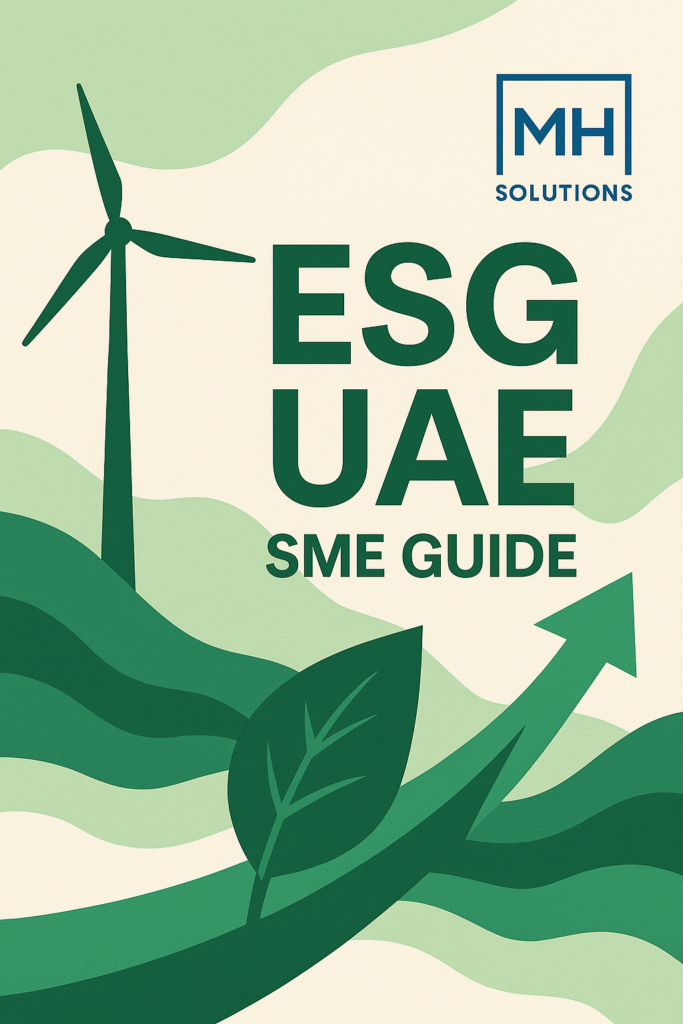As the UAE accelerates its sustainability mission, ESG reporting UAE is quickly moving from a voluntary initiative to a regulatory requirement. With landmark laws like the UAE Climate Law taking effect in 2025, every business—from listed corporations to startups—must understand what ESG compliance 2025 involves and how to align with new expectations. This guide is especially crafted for small and medium-sized enterprises (SMEs) looking to get ahead.(ESG UAE SME Guide)
Why ESG Matters for UAE Businesses in 2025
The UAE aims to achieve Net Zero by 2050, making ESG a cornerstone of national policy. ESG UAE SME Guide (Environmental, Social, Governance) metrics are no longer just nice-to-have indicators; they are becoming a critical compliance benchmark. Failure to act can result in steep penalties, reduced investor interest and reputational risks.
ESG Compliance 2025: Key Regulations You Must Know

1. Federal Decree-Law No. 11 of 2024 (UAE Climate Law)
- Effective from: May 30, 2025
- Who it applies to: High emitters (500,000+ metric tons CO2e/year)
- Requirements:
- Report Scope 1 and Scope 2 emissions; some may need Scope 3
- Keep records for five years (audit-ready)
- Submit data via the Ministry of Climate Change platform
- Penalties: Fines from AED 50,000 to AED 2,000,000
2. Mandatory ESG UAE SME Guide & Reporting for Listed Companies
- Must comply with GRI (Global Reporting Initiative) standards
- Adopt TCFD (Task Force on Climate-related Financial Disclosures)
- Set science-based net-zero targets
- Risks of non-compliance: Regulatory action and reduced investor trust
ESG UAE SME Guide: What Smaller Businesses Should Do
1. Conduct a Materiality Assessment
Identify ESG issues most relevant to your operations and stakeholders, like energy use, labor conditions and ethical sourcing.
2. Start Tracking Environmental Data
Even if not mandatory yet, begin logging electricity, water usage and waste to build a data baseline.
3. Use Global ESG Frameworks
Adopt GRI or TCFD frameworks for structuring simplified SME reports.
4. Set Decarbonization Goals
Establish short- and long-term emission reduction plans tailored to your sector.
5. Maintain ESG Records
Keep data organized and audit-ready for at least five years.
6. Assign ESG Responsibilities
Appoint an ESG lead internally or seek external advisory to support compliance.
Benefits of ESG Reporting UAE for SMEs
- Investor Confidence: ESG transparency helps secure loans and attract stakeholders
- Operational Resilience: Identifies risks early, improving continuity
- Brand Image: Strong ESG signals trust and responsibility
- Future Compliance: Early adoption means easier alignment with upcoming laws
How MH Solutions Can Help
MH Solutions offers tailored ESG advisory services for SMEs in the UAE:
- ESG strategy and planning
- Reporting based on GRI and TCFD
- Compliance tracking tools
- Emissions accounting and mitigation
- Ongoing advisory and audit prep
Visit mhsolutionuae.com or contact us at +971 555594403 for expert guidance.
FAQs
Q1: Is ESG reporting mandatory for all businesses in 2025?
Not yet. But it is compulsory for high emitters and listed firms. SMEs are advised to prepare.
Q2: What penalties apply for non-compliance?
Fines range from AED 50,000 to AED 2 million depending on the breach.
Q3: Are there ESG templates for SMEs?
Yes, simplified GRI and TCFD formats are available for small businesses.
Q4: How long should ESG data be retained?
Minimum five years for audit-readiness.
Q5: Can MH Solutions help my SME with ESG setup?
Absolutely. We provide end-to-end ESG strategy, reporting and compliance services.

